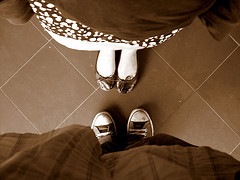
Photo by said&done.
Why do we need our personal space? Are we just territorial? It's actually about protection, reducing stress, and focus. In Social Psychology: Theories, Research, and Applications, Robert S. Feldman identifies three models that explain why we need our personal space.
3 Models of Why We Need Our Space
The three models are:
- The overload model
- Stress theory
- Communication channel
Personal Space and Information Overload
Feldman writes:
"When others stand very close to us, their voices seem louder, we may feel (and smell) their hot breath, we may notice wrinkles in their skin. In other words, we are bombarded with sensory stimulation, all of which must be processed cognitively. The overload model of personal space builds upon this possibility by suggesting that we maintain personal space in order to reduce the potential "overload” on our information processing systems (G. E. Evans, 1974). By keeping others at a distance, we are able to maintain control over the stimulation that we would otherwise be forced to process. "Personal Space as Protection
... What is clear that the study confirms that personal space invasion is related to increases in physiological stress; thus, an important function of maintenance of personal space zones may be to protect people from excessive stress.”
Feldman writes:
"An alternative – though not mutually exclusive – approach to explaining the functions of personal space suggest that personal space zones serve to protect us from stress. This model known as stress theory, says that personal space can shield us from stressful stimuli that may be present when others come too close to us. What are these potential stressors? G.W. Evans (1979) suggest an important one is potential aggression that may come from others. If we allow other people to get too close to us, an act of aggression can have serious consequences. On the other hand, if we maintain our distance, an aggressive act will have less significance. Similarly, maintenance of personal space zones allows us to fend off high levels of noise that may emanate from other people. In sum, personal space may afford us protection from unwanted stressful stimuli."Personal Space as a Communication Channel
Feldman writes:
“…. Interpersonal spacing can reflect the nature of the relationship between individuals, and is also related to other nonverbal behaviors such as eye contact and body orientation. Thus, maintenance of personal space zones can be conceptualized largely a matter of controlling the type of message individuals want to communicate to others with whom they are interacting."
Key Take Aways
I think this actually explains the effectiveness of Feng Shui and why it helps you feel good.
- Your personal bubble can help reduce your stress. When people are in our immediate space, the threat of potential aggression has more impact. Our bodies go into red alert. If you've ever had your brother or sister intently hold their finger a couple inches from your body while they say, "I'm not touching you ... I'm not touching you .... I'm not touching you" you know the feeling.
- Your personal bubble can help you stay focused. You reduce information overload. Your personal space helps shield you from the dynamics of people around you. If your focus is on everything that's going on around you, it's tough to stay focused. Effectively the more you can reduce distractions, the more you can stay focused on your task. I know some people use music as their shield. A common practice for contractors that share a space is to wear headphones to create white noise, to stay more focused.
Additional Information
The following pages present various perspectives on whether shared workspaces, cubes or private offices are more effective:

3 comments:
you touched very very important topic. For me it is vital. I am consultant - field warrior. When I am onsite with the customer I do not have my own seat there, so it can anything from cafeteria, to just sitting on the floor, while having bunch of folks around waiting for the solution I am to provide. Terrible situation. I’ve created a practice of carrying earphones with me and collecting great music. That way I really do not care where I drop my ass – I just put the earphones on, turn great inspiring music and the solution comes to me instantly. To make it happen I need:
- My earphones
- My knowledgebase and checklists – got it in my Outlook
- The mindset for results
Simple, no?
It sounds like you've mastered an important concept. You found your personal way of switching mindsets and creating your personal space, regardless of where you are.
not exactly.
I mastered to focus and ignore surrounding noises. I am still terrible on switching mindsets - this one is really tough for me, I am trying different techniques - but none was successful for me. The only that gets any close to effective one is thinking of result of not switching to proper mindset. “Alik, if you are not switching to this/that right now you won’t hit the deadline or you will need to invest extra time on expense of family time”. It partially works
Post a Comment